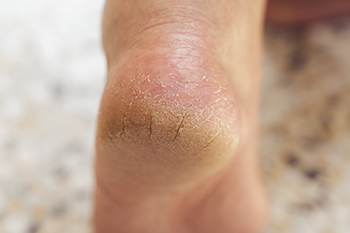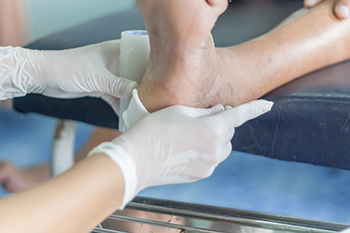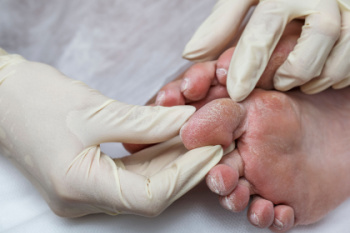

Getting a gait analysis at a running store may not give the most accurate results for choosing the right running shoes. Many stores use simple arch tests, which do not fully capture the complexity of individual foot movement. Standing on a surface does not mimic how feet move while running, and even video analysis of running may miss important details. Foot motion is not just about arch shape or basic pronation. It can involve the inner arch dropping, the heel tilting, or the forefoot rotating. Often, these movements happen together, making foot mechanics more complex than store tests suggest. For a true understanding of how your feet move and the best shoe fit, it is suggested that seeing a podiatrist is a better choice. This type of doctor can evaluate your whole body’s movement to ensure you get shoes that match your unique needs.
You should always make sure your running shoes fit properly in order to avoid injury. For more information, contact Dr. Sybil J. Fisher from Texas. Our doctor can provide the care you need to keep you pain-free and on your feet.
Choosing the Right Running Shoe for Your Foot Type
Improper shoe sizing can cause a myriad of problems for your feet. Shoes that don’t fit you properly can lead to muscular imbalances in your body, which can result in foot, knee, and hip injuries.
Tips for Finding the Right Running Shoe
If you have any questions please feel free to contact our one of our offices located in Houston and Sugar Land, TX . We offer the newest diagnostic and treatment technologies for all your foot and ankle needs.

Cracked heels are a common foot condition characterized by dry, thickened skin that develops fissures around the edges of the heel. Common causes include prolonged standing, improper footwear, dry skin, and underlying health issues such as diabetes or eczema. Symptoms often include visible cracks, rough skin, discomfort, and sometimes bleeding or pain. If left untreated, cracked heels can lead to infections and more serious complications. Treatment involves moisturizing the feet regularly, using exfoliating scrubs to remove dead skin, and wearing supportive shoes to alleviate pressure. A podiatrist can provide specialized care, offering treatments such as professional debridement, customized orthotics, and tailored advice on foot care routines. If you are struggling with cracked heels, consulting a podiatrist is suggested. They can accurately assess your condition and develop a personalized treatment plan to restore your foot health.
Cracked heels are unsightly and can cause further damage to your shoes and feet. If you have any concerns, contact Dr. Sybil J. Fisher from Texas. Our doctor can provide the care you need to keep you pain-free and on your feet.
Cracked Heels
Cracked heels appear unappealing and can make it harder for you walk around in sandals. Aside from looking unpleasant, cracked heels can also tear stockings, socks, and wear out your shoes. There are several methods to help restore a cracked heel and prevent further damage.
How Do You Get Them?
Dry skin is the number one culprit in creating cracked heels. Many athletes, walkers, joggers, and even swimmers suffer from cracked heels. Age and skin oil production play a role to getting cracked heels as well.
Promote Healing
Over the counter medicines can help, especially for those that need instant relief or who suffer from chronic dry feet.
Wear Socks – Wearing socks with medicated creams helps lock in moisture.
Moisturizers – Applying both day and night will help alleviate dryness which causes cracking.
Pumice Stones – These exfoliate and remove dead skin, which allows for smoother moisturizer application and better absorption into the skin.
Change in Diet
Eating healthy with a well-balanced diet will give the skin a fresh and radiant look. Your body responds to the kinds of food you ingest. Omega-3 fatty acids and zinc supplements can also revitalize skin tissue.
Most importantly, seek professional help if unsure how to proceed in treating cracked heels. A podiatrist will help you with any questions or information needed.
If you have any questions, please feel free to contact one of our offices located in Houston and Sugar Land, TX . We offer the newest diagnostic and treatment technologies for all your foot care needs.

Open wounds on the feet are common injuries that vary in type and severity. Types include abrasions or scrapes, lacerations or deep cuts, punctures, and ulcers. These wounds are prone to infection without proper care, especially since feet are often exposed to bacteria. In severe cases, untreated wounds can lead to complications like cellulitis, abscess formation, and even tissue death that require more intensive intervention. Basic treatment includes cleaning the wound, applying an antiseptic, and covering it with a sterile dressing. Podiatrists may recommend antibiotics for infections, debridement to remove dead tissue, and wound care products to promote healing and prevent complications. If you have a foot wound due to an underlying medical condition like diabetes, or if you notice signs of infection, such as increased redness, swelling, warmth, pus, or worsening pain, it is strongly suggested that you visit a podiatrist for care.
Wound care is an important part in dealing with diabetes. If you have diabetes and a foot wound or would like more information about wound care for diabetics, consult with Dr. Sybil J. Fisher from Texas. Our doctor will assess your condition and provide you with quality foot and ankle treatment.
What Is Wound Care?
Wound care is the practice of taking proper care of a wound. This can range from the smallest to the largest of wounds. While everyone can benefit from proper wound care, it is much more important for diabetics. Diabetics often suffer from poor blood circulation which causes wounds to heal much slower than they would in a non-diabetic.
What Is the Importance of Wound Care?
While it may not seem apparent with small ulcers on the foot, for diabetics, any size ulcer can become infected. Diabetics often also suffer from neuropathy, or nerve loss. This means they might not even feel when they have an ulcer on their foot. If the wound becomes severely infected, amputation may be necessary. Therefore, it is of the upmost importance to properly care for any and all foot wounds.
How to Care for Wounds
The best way to care for foot wounds is to prevent them. For diabetics, this means daily inspections of the feet for any signs of abnormalities or ulcers. It is also recommended to see a podiatrist several times a year for a foot inspection. If you do have an ulcer, run the wound under water to clear dirt from the wound; then apply antibiotic ointment to the wound and cover with a bandage. Bandages should be changed daily and keeping pressure off the wound is smart. It is advised to see a podiatrist, who can keep an eye on it.
If you have any questions, please feel free to contact one of our offices located in Houston and Sugar Land, TX . We offer the newest diagnostic and treatment technologies for all your foot care needs.

Proper foot care is vital for diabetic patients, as diabetes can lead to nerve damage and poor circulation, which increase the risk of foot complications. Regularly inspecting the feet for cuts, blisters, or redness is essential, as early detection can prevent serious issues. Keeping the feet clean and dry helps reduce the risk of infections. It is important to moisturize the skin, but avoid applying lotion between the toes to prevent excess moisture. Wearing well-fitted shoes is important to prevent friction and blisters, while checking inside shoes for foreign objects daily can help avoid injuries. Maintaining blood sugar levels within a target range contributes to overall foot health. If you have diabetes, it is strongly suggested that you are under the care of a podiatrist and schedule routine visits. This type of doctor can help you to manage this serious condition.
Diabetic foot care is important in preventing foot ailments such as ulcers. If you are suffering from diabetes or have any other concerns about your feet, contact Dr. Sybil J. Fisher from Texas. Our doctor can provide the care you need to keep you pain-free and on your feet.
Diabetic Foot Care
Diabetes affects millions of people every year. The condition can damage blood vessels in many parts of the body, especially the feet. Because of this, taking care of your feet is essential if you have diabetes, and having a podiatrist help monitor your foot health is highly recommended.
The Importance of Caring for Your Feet
Patients with diabetes should have their doctor monitor their blood levels, as blood sugar levels play such a huge role in diabetic care. Monitoring these levels on a regular basis is highly advised.
It is always best to inform your healthcare professional of any concerns you may have regarding your feet, especially for diabetic patients. Early treatment and routine foot examinations are keys to maintaining proper health, especially because severe complications can arise if proper treatment is not applied.
If you have any questions please feel free to contact one of our offices located in Houston and Sugar Land, TX . We offer the newest diagnostic and treatment technologies for all your foot and ankle needs.
Copyright © 2016 S.J. Fisher DPM | Site Map | Design by: Podiatry Content Connection